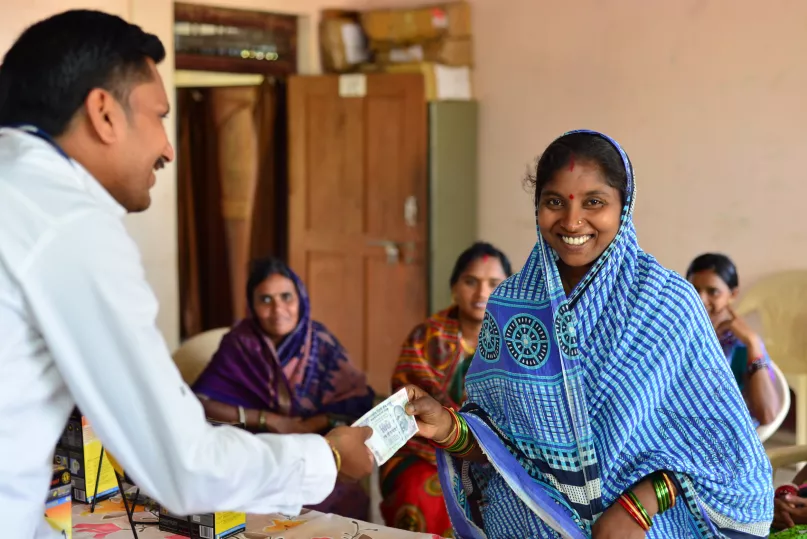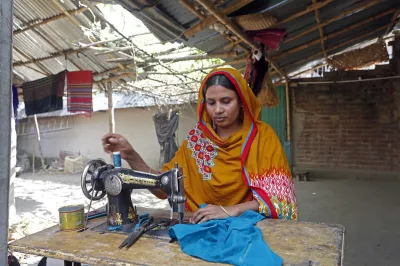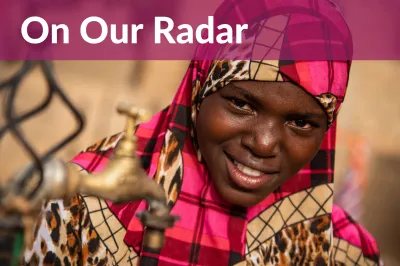Seeking Concrete Actions to Empower Women Financially Through the Generation Equality Forum

The insufficient and fragile progress made in the 26 years since the Fourth World Conference on Women took place in Beijing, combined with the socio-economic impact of COVID-19, requires urgent and bold action. No one can dispute the inequality data, as it is clear, but so is the evidence base for the promise of gender equality. Countering the COVID-19 pandemic’s gender-regressive effects alone could show $13 trillion in global GDP gains by 2030.
The Generation Equality Forum (GEF), a civil society-centered, multi-stakeholder, and global gathering for gender equality, convened by UN Women and co-hosted by the governments of Mexico and France, in partnership with civil society and youth, is seeking to address some of those inequality issues. Through co-creation and diverse and inclusive consultations, the Forum brings together feminist advocates from across the globe to foster action and renew movements for gender equality and launch a set of six innovative and multi-stakeholder Action Coalitions.
PayPal’s decision to get involved was a no-brainer, as the goals of the Generation Equality Forum align with our values as an organization and allow us to bring focus and prioritization to the urgency of the gaps and the opportunities that are possible as we all strive to overcome the setbacks of the pandemic.
In 2020, I was recruited by PayPal from the Bill & Melinda Gates Foundation to serve as Head of Global Social Innovation. I was barely six weeks into my new role when I pitched the opportunity to PayPal’s senior leadership. It was a Friday night, and before Monday morning, I received not only the green light but also strong support from our leaders, including our president and CEO, to submit our letter of interest. We are honored to have been selected to serve on the leadership group of an Action Coalition and to be among a group of private sector companies that are engaged in the overall Generation Equality Forum.
The Action Coalitions engage governments, civil society organizations, as well as the private sector to:
· Catalyze collective action.
· Spark global and local conversations among generations.
· Drive increased public and private investment.
· Deliver concrete, game-changing results across generations for girls and women.
Some FinEquity members are already among the Action Coalition leaders including UNCDF, CARE International, and the Bill & Melinda Gates Foundation.
The draft actions released on March 8 from each Action Coalition were developed through a highly dynamic and iterative process of co-creation across all their leadership structures. The actions seek to spark conversations and set a level of ambition to accelerate progress as well as to make concrete change towards gender equality and the realization of girls’ and women’s rights. These draft actions have continued to evolve towards more detailed thematic blueprints that are inclusive of actions, targets, commitments, and a five-year accountability framework.
Generation Equality Forum’s five-year timeline to implement its vision includes the following goals:
- Economic justice and rights will be guaranteed for women and girls, in all their diversity.
- Systems and structures are gender-responsive and ensure equitable, secure access to resources, services, and decision-making.
- Participation in gender-transformative enterprise and trade.
- Promotion of non-discriminatory labor markets, free of violence and harassment.
- A care economy that equitably shares and values care and domestic work.
- Resilience to economic shocks, such as the COVID-19 pandemic.
- Accountability is strengthened through gender-responsive economic laws and policies, sex-disaggregated data, and gender statistics.
- Diverse women’s and girl’s voices are truly heard and their leadership is a reality.
Over the past 20 years that I have worked on women’s economic empowerment, gender equality has ebbed and flowed in popularity. It has never been a number one priority, and I don’t think competing with other development issues is where we should put our energy.
We should seize this moment to close gender gaps once and for all by mainstreaming them into the recovery and rebuilding efforts of the COVID-19 pandemic. We can leverage the Generation Equality Forum to be the action-forcing enabler to get the decision-makers to say “yes” quickly to unleash the funding, evolve policies and regulations, sex-disaggregate the data, and mainstream gender-transformative interventions.
On International Women’s Day, I shared some of the evidence base as well as recommendations related to economic justice and rights. For example:
- Women’s jobs globally have been 1.8 times more vulnerable to the pandemic than men’s jobs.
- Women’s caring burden increased by a further 30-40%, since the beginning of the pandemic.
- By end of 2021, around 435 million women and girls will live on less than $1.90 a day.
As I look ahead, it is this next generation of women and girls who will be heads of state, CEOs, leading economists, and helming social justice movements. When they do the accounting, they will see a pronounced dip in progress in 2020. They will also trace their fingers upward along with a steep growth in progress that reflects the rapid acceleration made possible by new, game-changing commitments, and the actions we all make in the coming months.
To all of you, my partners in this important mission, let’s collaborate to ensure both an accelerated recovery and still faster ascent. The answers, the innovations are among us, we know what to do.
Here are five ways FinEquity members can get involved:
- Become a Commitment Maker.
- Participate in the Generation Equality Forum Public Conversation.
- June 30-July 2: Save the Date for the Paris Generation Equality Forum.
- Raise Awareness: Equip your advocacy with ideas and resources, including an #ActForEqual video.
Funders, let’s hurry up and fund the hard stuff, like informal barriers, social and cultural norms, the public goods, the data gathering and disaggregating.
Practitioners, tell us financial service providers what to do, especially share the bold ideas – let’s not waste time – let’s innovate, iterate, take risks.
Researchers, hold us accountable by measuring progress.
The time is now. The opportunity is here. And lucky for us, we have each other and FinEquity to help us.


